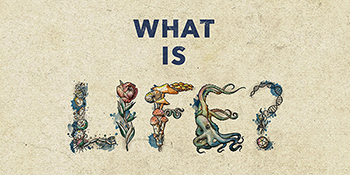What Is Life: Is Life Inevitable?
 When: Wed., Dec. 6, 2017 at 7:30 pm - 8:45 pm
When: Wed., Dec. 6, 2017 at 7:30 pm - 8:45 pmWhere: Caveat
21 Clinton St.
212-228-2100 Price: $20
Buy tickets/get more info now
See other events in these categories:
 The question “What is life?” takes just three words. But it is one of the hardest questions in science, attracting researchers from a huge range of disciplines, from molecular biology to astronomy to philosophy. This fall, science writer Carl Zimmer delves into this question by talking to eight experts over four nights to understand what the newest research tells us about life.
The question “What is life?” takes just three words. But it is one of the hardest questions in science, attracting researchers from a huge range of disciplines, from molecular biology to astronomy to philosophy. This fall, science writer Carl Zimmer delves into this question by talking to eight experts over four nights to understand what the newest research tells us about life.
December 6th’s performance will feature physicist Jeremy England and biologist Steven Benner, as they join Zimmer to tackle the question “Is life inevitable?”
Jeremy England is an Associate Professor in the Department of Physics at MIT. Trained both as a biochemist and as a theoretical physicist, he has long been fascinated by the way living things function at the molecular level, and did his early work on the statistical mechanics of protein structure. More recently, he has become interested in understanding the physics of when and how matter starts to behave in life-like ways. Self-replication, energy harvesting, and predictive computation are all hallmarks of life – Dr. England applies principles of thermodynamics to understanding when these and other phenomenon might be expected to emerge spontaneously.
Steven Benner is a Distinguished Fellow in the Westheimer Institute at the Foundation for Applied Molecular Evolution, which he founded after serving on the faculty at Harvard, the ETH Zurich, and the University of Florida. His research has been instrumental in the initiation and development of many fields, including synthetic biology, paleogenetics, evolutionary bioinformatics, planetary biology and astrobiology. His laboratory was the first to redesign DNA to expand the genetic alphabet, resurrect genes and proteins from extinct organisms, organize whole genome databases according to their evolutionary history, and successfully predict how proteins fold. His most recent book is: “Life, the Universe, and the Scientific Method.”
Carl Zimmer is a columnist for the New York Times, where his column “Matter” appears each week. He is the author of thirteen books on science, and is a frequent guest on radio programs and podcasts such as Radiolab. In 2016, Zimmer won the Stephen Jay Gould Prize, awarded annually by the Society for the Study of Evolution to recognize individuals whose sustained efforts have advanced public understanding of evolutionary science.
This program is a collaboration between The Story Collider and Caveat, and is supported by Science Sandbox, a Simons Foundation initiative dedicated to engaging everyone with the process of science.
Buy tickets/get more info now
 Discover More
Discover More